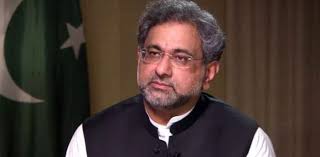Country may be ‘forced’ to import wheat: Khaqan

Former prime minister and head of Awam Pakistan Party Shahid Khaqan Abbasi on Thursday warned that the country may be forced to import wheat in the coming year, if the current challenges including high input cost and low prices, faced by farmers were not urgently addressed.
Addressing a press conference flanked by former finance minister Miftah Ismail here on Thursday, Abbasi strongly criticised the government over two major issues including the challenges faced by farmers and the lack of relief on petroleum products for the public.
The country’s economy could not run if the economy of farmers was destroyed, said Abbasi, adding that farmers’ expenses were increasing while the wheat price was going down.
He said that farmers across the country were enduring severe hardships and are protesting nationwide, yet their grievances are not being addressed.
“Farmers grow wheat, which becomes the nation’s flour. If the farmer is in distress, everyone will be affected,” he said. “Today farmers are subjugated, tomorrow they will not cultivate wheat, which will adversely affect the economy,” he said. “If you import wheat, it will not be cheaper than 3,500 rupees,” said Abbasi, adding that the farmer could not bear the burden of cutting price of bread.
He pointed out that farmers also faced difficulties in 2023, and in 2024 the government announced it would not purchase wheat at Rs4,000 per 40kg. As a result, farmers were forced to sell at varying prices —some at Rs2,200 and others at Rs2,400 per 40kg.
Abbasi added that with a steep rise in the prices of urea and electricity, farmers are now compelled to sell wheat at Rs2,100 per 40kg — despite their production cost being much higher.
“When the farmer prospers, the country prospers. But today, farmers invest their assets and still can’t make a profit.”
He warned that if the situation continues, Pakistan may have to import wheat next year. He demanded that if local markets are not favourable for farmers, they should at least be allowed to export their wheat.
“Today, it costs a farmer Rs3,000 to produce a 40kg bag of wheat, yet they are forced to sell it at Rs2,100. Don’t sacrifice farmers for a few votes,” Abbasi said. “If their income doesn’t grow, other sectors like tractors and motorcycles will also be affected.”
He also criticised the Punjab government’s incentive scheme, saying it benefits only a few, while the majority of farmers remain deprived.
He called for the government to set a fair wheat support price that benefits both the public and the farming community.
He also criticised the government decisions, questioning the recent decision of linking road development in Balochistan to petroleum savings.
“If there are no savings from petroleum, does that mean roads in Balochistan would not be built?” he asked.
Abbasi strongly criticised the government for failing to provide relief on petroleum products. He noted that global oil prices have dropped multiple times, yet the government has failed to pass on those savings to the public.
“There was room for a Rs10 reduction in old billing calculations, but people still received no relief,” he said. He said the tax could not be imposed with an ordinance, adding that it is the mandate of the Parliament.
Abbasi questioned why fuel prices are passed on to consumers when international markets rise but not when they fall.
“We hear that profits from petroleum will be used to build roads in Balochistan — but if there are no savings, will Balochistan not get roads?” he asked.
He said that national progress comes from positive government decisions, but this administration has once again missed an opportunity to provide relief to the public.





